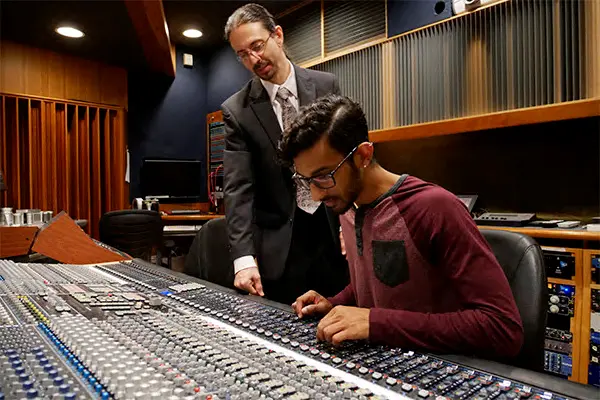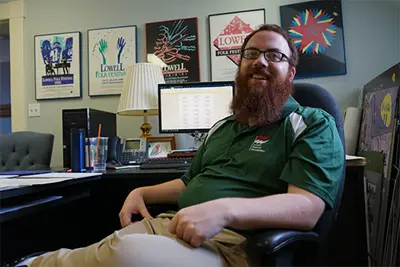Moylan Hands Over Program He’d Helmed Since its Inception
 Image by Greg Mahan '18
Image by Greg Mahan '18
09/20/2018
By David Perry
Prof. William Moylan knew he was ready to let go of the Sound Recording Technology program. The end had been peeking over the horizon at him, and he felt a growing need to engage in research he’d been putting off, to write that next book about sound and recording.
Over the past few months, Moylan, who built the SRT program from the ground up, quietly handed the microphone to Brandon Vaccaro. Moylan had been the only coordinator the program has had since its inception in 1983.
“It’s time,” says Moylan.
Vaccaro arrived at UMass Lowell in 2014 as a lecturer in the music department from Kent State University, where he taught for four years. He holds a doctorate in composition from the University of Colorado, Boulder, and master’s and bachelor’s degrees from the University of Denver’s Lamont School of Music.
In addition to being a seasoned academic, Vaccaro is an award-winning composer for film and television, a music producer and an audio engineer.
“When I was hired here in 2014, there was already talk about who might take over when Will stepped down,” Vaccaro says. “This program is one of the first of its kind – in many ways, a prototype for a lot of the programs that have followed around the country. I’m only the second coordinator, and we share a similar vision on how the program should work. I think he felt it would be in good hands when he stepped down.”
His short-term goals include completing a curriculum update.
“Aside from a few changes to address evolving general education requirements and general music requirements within the music department, the SRT portion of the degree has had few changes in the last 35 years,” he says.
Adding New Tracks
Long-term, Vaccaro plans to expand course offerings to include “event audio, interactive media and augmented reality/virtual reality, and possibly looking at new SRT-related majors and minors that might better serve students in those new career paths.”
Music Department Chair Alan Williams says Vaccaro’s experience and knowledge expand the program’s breadth.
“Brandon brings experience working deeply with sound-for-picture projects,” says Williams. “That alone expands SRT’s focus into an evolving industry.”
Vaccaro grew up in Denver in a family of musicians, hearing everything from symphonies to radio pop. But as a guitarist, he was ultimately drawn to players who straddled rock, jazz and the avant-garde – John Zorn, Marc Ribot, Bill Frisell. As he started his career, he considered himself a musician, not a recording engineer.
“The studio was always my day job that supported my composing habit,” says Vaccaro. “But a couple years into my career, I applied for a job in teaching composing and theory. They were interested in the recording part of my resume more than my composing. I had 10 years of experience at that point, and composing is extremely competitive. Every job has a list of rock star composers going for it, highly commissioned composers. I was not that guy. It just seemed everything had lined up for me to change direction.”
Now, he’s leading a sound recording program that he calls “one of the best” in the field.
The program has produced several Grammy and Emmy award winners in numerous genres. Chances are good that if you hear a remastered Pearl Jam or Pink Floyd album a UMass Lowell SRT grad’s fingerprints are on it. Likewise for the sound crew of “Monday Night Football” or the State of the Union address.
“We have alumni working at the top of their respective fields in areas like audio mastering, large ensemble recording production, commercial music recording production, audio for film and television, sports broadcasting and radio,” Vaccaro says. But he is just as proud of those who work away from the spotlight.
“Over 90 percent of our graduates find work in audio-related careers, and most of them are still in audio-related careers 10 years after graduation … The emphasis on math, physics, electrical engineering and computer science in our degree has allowed our graduates to pivot to other industry segments as the world of audio technology has changed and evolved,” he says.
Moylan, who continues to teach, says Vaccaro is organized, passionate and has a strong sense of the SRT’s program heritage and a vision for its future.
Ultimately, at its core, the SRT program is about the nuts and bolts of recording, no matter the medium, Vaccaro says.
“It’s about what’s happening under the hood,” he says. “It’s about having the foundation to be able to make professional changes that are five, six years down the road.”




